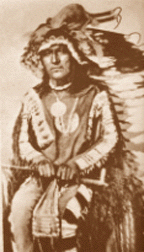

Roman Nose was a Cheyenne chief and a contemporary of Dull Knife. He was not as strong a character as the other, and was inclined to be boastful; but with all this he was a true type of Native American in spirit and bravery.
While Dull Knife was noted in warfare among the Native Americans, Roman Nose made his record against the US soldiers in defense of territory embracing the Republican and Arickaree rivers. He was killed on the latter river in 1868, in the celebrated battle with General Forsythe.
No Greek or Roman gymnast was ever a finer model of physical beauty and power. He thrilled his men to frenzied action when he came upon the field. It was said of him that he sacrificed more youths by his personal influence in battle than any other leader, being very reckless himself in grand-stand charges. He was killed needlessly in this manner.
Roman Nose always rode an uncommonly fine, spirited horse; and with his war bonnet and other paraphernalia, gave a wonderful exhibition. He did a remarkable thing once when on a one-arrow-to-kill buffalo hunt with his brother-in-law. His companion had selected his animal and drew so powerfully on his bowstring that it broke. Roman Nose had killed his own cow and was whipping up close to the other when the misfortune occurred. Both horses were going at full speed and the arrow jerked up in the air. Roman Nose caught it and shot the cow for him.
Perhaps no other chief attacked more emigrants going west on the Oregon Trail between 1860 and 1868. When the Northern Cheyenne's under this daring leader attacked a body of scouting troops under the brilliant officer General Forsythe, Roman Nose thought that he had a comparatively easy task. The first attack failed, and the command entrenched itself on a little island. The wily chief thought he could stampede them and urged on his braves with the declaration that the first to reach the island should be entitled to wear a trailing war bonnet. According to Army accounts, it was a thrilling moment, and might well have proved disastrous to the Forsythe command, whose leader was wounded and helpless. The danger was acute until Roman Nose fell, and even then his lieutenants were bent upon crossing at any cost, but some of the older chiefs prevailed upon them to withdraw.
So the brilliant war chief of the Cheyenne's came to his death. If he had lived until 1876, Sitting Bull would have had another bold ally.
